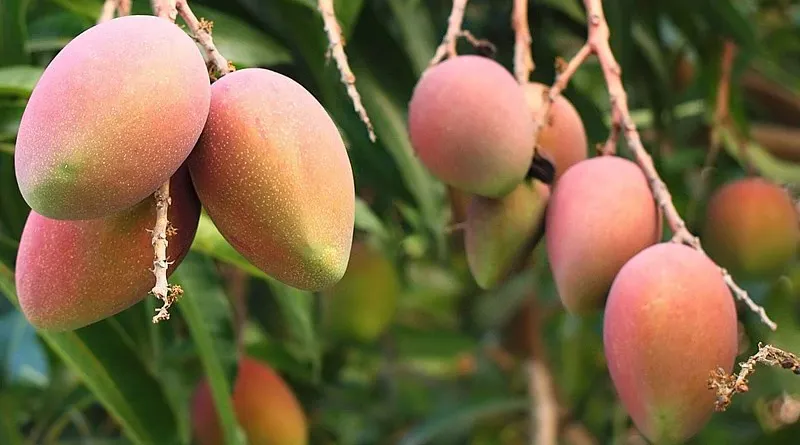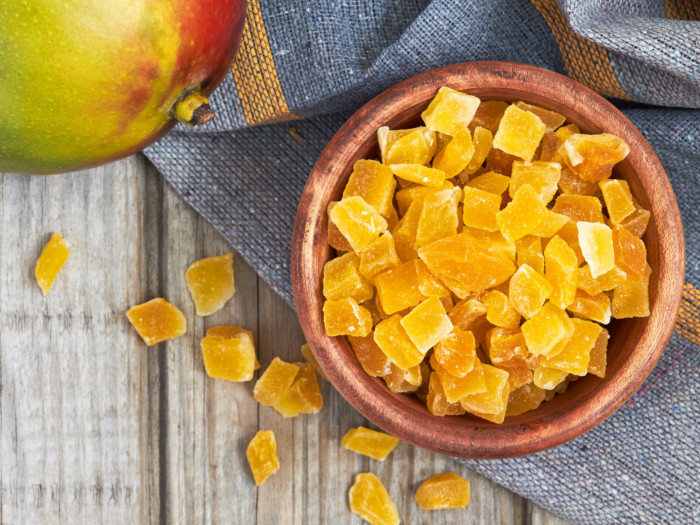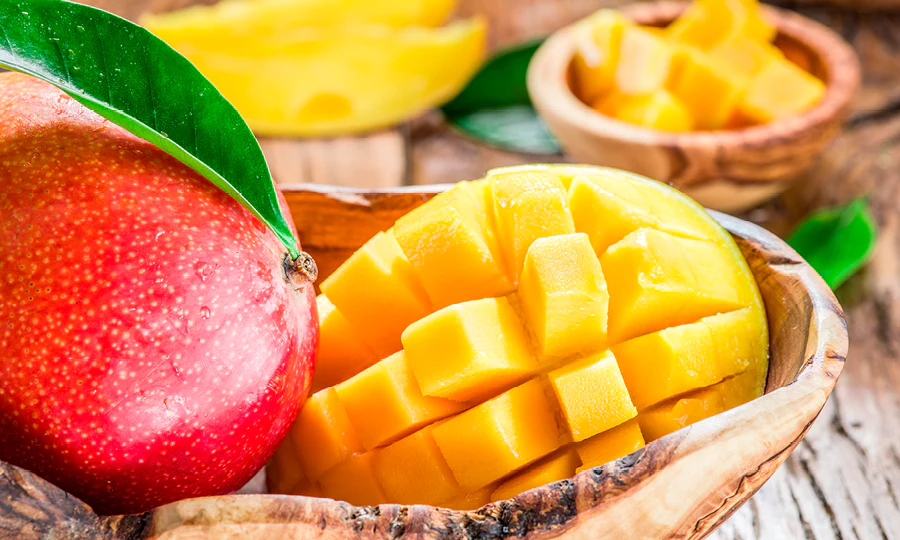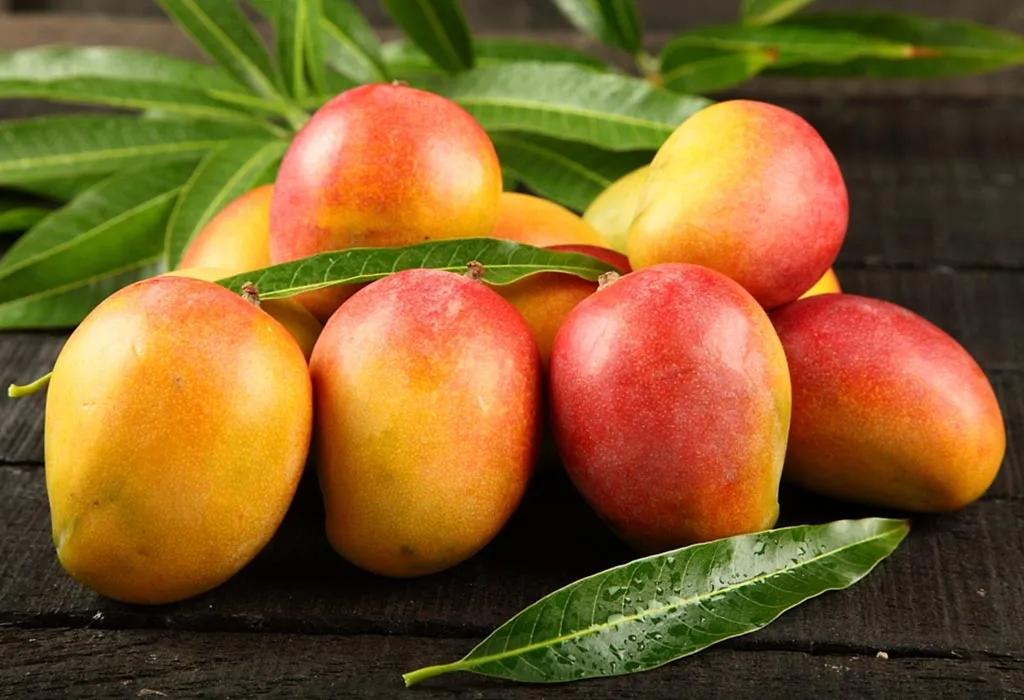Mango is originally from India and Southeast Asia, where it has been cultivated for over 4,000 years. There are numerous varieties of mango, each with its unique taste, shape, size, and color.. From there, they were spread through trade routes to Africa, Brazil, the Caribbean, and Mexico. Eventually, it also reached Spain, Florida, California, and Hawaii, gaining worldwide popularity.
Not only is mango delicious, but it also offers remarkable nutritional benefits. Here are ten advantages of mango, which include an overview of its nutritional content and some suggestions on how to enjoy it.

Top 10 health benefits of mango
Packed with nutrients
Many people adore mango not only for its delicious taste but also for its exceptional nutritional value.
A single cup (165 grams) of fresh mango provides the following:
- Calories: 99
- Protein: 1.4 grams
- Carbs: 24.7 grams
- Fat: 0.6 grams
- Fiber: 2.6 grams
- Sugar: 22.5 grams
- Vitamin C: 67% of the Daily Value (DV)
- Copper: 20% of the DV
- Folate: 18% of the DV
- Vitamin B6: 12% of the DV
- Vitamin A: 10% of the DV
- Vitamin E: 10% of the DV
- Vitamin K: 6% of the DV
- Niacin: 7% of the DV
- Potassium: 6% of the DV
- Riboflavin: 5% of the DV
- Magnesium: 4% of the DV
- Thiamine: 4% of the DV
One noteworthy aspect is that consuming just one cup (165 grams) of fresh mango provides around 67% of the recommended daily vitamin C intake, which is crucial for boosting your immune system, aiding iron absorption, and supporting cell growth and repair.
Mango is also rich in essential minerals like copper and folate, particularly beneficial during pregnancy as they promote healthy fetal growth and development.
Mango is a low-calorie fruit packed with nutrients, especially vitamin C, which plays a vital role in immunity, iron absorption, and cell growth and repair.
Low in calories
Another advantage of mango is its low-calorie content.
A cup (165 grams) of fresh mango contains fewer than 100 calories. It has a remarkably low-calorie density, meaning that it provides relatively few calories for the volume of food it offers.
Most fresh fruits and vegetables tend to have a low-calorie density. A study discovered that consuming fresh fruit like mango at the beginning of a meal could help prevent overeating later.
However, it’s important to note that this may not hold for dried mango. Just one cup (160 grams) of dried mango contains 510 calories and 106 grams of sugar and has a higher calorie density.
Although dried mango retains its nutritional value in terms of vitamins, minerals, and antioxidants, it might be advisable to consume it in moderation due to its high-calorie density and sugar content.
In summary, a serving of one cup (165 grams) of mango contains less than 100 calories. Its low-calorie density makes it an excellent choice if you’re aiming to reduce your calorie intake while still feeling full and satisfied.
It may help prevent diabetes.
Fresh mango contains a relatively high amount of natural sugar compared to other fresh fruits, with over 22 grams per cup (165 grams).
Although this may raise concerns for individuals with metabolic conditions like diabetes or those trying to limit their sugar intake, no evidence suggests that consuming fresh mango leads to diabetes or is unhealthy for people with this condition.
Several studies have linked higher consumption of fresh fruit with a lower risk of diabetes.
Limited research has specifically examined the relationship between fresh mango and diabetes. However, one study found that incorporating 10 grams of freeze-dried mango into the daily diet for 12 weeks significantly improved blood sugar levels.
Another recent study concluded that consuming fruits and vegetables rich in vitamin C and carotenoids could help prevent the onset of diabetes. Since mango is high in both nutrients, it may offer similar benefits, although further research is needed.
Nevertheless, due to its high natural sugar content, consuming excessive amounts of mango at once can cause a spike in blood sugar levels. Therefore, it is advisable to consume mango in moderation, typically about 1 cup (165 grams) per serving.
Pairing it with other fiber- and protein-rich foods may also help regulate blood sugar spikes.
If fresh mango is consumed in moderate amounts, it is unlikely to increase the risk of developing diabetes. It’s important to note that fresh mango contains less sugar per serving than dried mango.
High in healthy plant compounds
Mango is rich in polyphenols, which are plant compounds that serve as antioxidants to protect your body.
This fruit contains more than a dozen different polyphenols in its flesh, peel, and even seed kernel. Some of these polyphenols include:
- Mangiferin
- Catechins
- Anthocyanins
- Gallic acid
- Kaempferol
- Rhamnetin
- Benzoic acid
Antioxidants protect your cells against free radicals, highly reactive compounds that can damage your cells.
Research has shown that free radical damage is associated with signs of aging and chronic diseases.
Among the various polyphenols found in mango, mangiferin has garnered significant attention and is sometimes referred to as a “super antioxidant” due to its exceptional potency.
Studies conducted on cells and animals have indicated that mangiferin may counteract free radical damage linked to conditions such as cancer, diabetes, and other illnesses.
Mango contains over a dozen polyphenols, including the powerful antioxidant mangiferin. These polyphenols function as antioxidants in your body.
Contains immune-boosting nutrients
Mango is a beneficial source of nutrients that can boost your immune system.
Consuming one cup (165 grams) of mango provides approximately 10% of your daily vitamin A requirement. Vitamin A is crucial for maintaining a healthy immune system, and insufficient intake of this vitamin is associated with an increased risk of infection.
Furthermore, one cup of mango supplies nearly 75% of your daily vitamin C needs. Vitamin C is vital in enhancing the production and effectiveness of disease-fighting white blood cells while improving your skin’s defense mechanisms.
In addition to these vitamins, mango contains other nutrients that support immune function, including copper, folate, vitamin E, and several B vitamins.
Mango is a good source of folate, various B vitamins, and vitamins A, C, K, and E. These nutrients work together to enhance your immune system.
Supports heart health
Mango is enriched with nutrients that contribute to a healthy heart.
For instance, it provides significant amounts of magnesium and potassium, which help maintain optimal blood flow. These nutrients aid in relaxing the blood vessels, promoting lower blood pressure levels.
The presence of mangiferin, a potent antioxidant found in mango, also appears to benefit heart health. Animal studies have shown that mangiferin can protect heart cells from inflammation, oxidative stress, and cell death.
Moreover, it may assist in reducing cholesterol levels, triglycerides, and free fatty acids in the bloodstream.
While these findings are promising, further research is needed to explore the effects of mangiferin on heart health in humans.
Mango contains magnesium, potassium, and the antioxidant mangiferin, all supporting healthy heart function.
It may improve digestive health.

Mango is great for digestive health because it possesses several qualities:
It contains digestive enzymes called amylases that break down large food molecules for easy absorption by the body.
Amylases specifically break down complex carbs into sugars like glucose and maltose. Ripe mangoes have more active amylases, making them sweeter than unripe ones.
Mango is rich in water and dietary fiber, which can help alleviate digestive issues such as constipation and diarrhea.
A 4-week study on adults with chronic constipation showed that consuming mango daily was more effective in relieving symptoms compared to taking a supplement with similar soluble fiber content as mango.
This indicates that mangoes may have additional components besides dietary fiber contributing to digestive health. However, further research is required.
Mango contains digestive enzymes, water, dietary fiber, and other compounds supporting various digestive health aspects.
It may support eye health.
Mango is packed with nutrients that promote healthy eyes:
It contains two important antioxidants, lutein and zeaxanthin, which are highly concentrated in the retina of your eye. These nutrients are particularly abundant in the macula, the central part of the retina responsible for converting light into signals for your brain to interpret.
Within the retina, lutein and zeaxanthin act as natural shields against excessive light by absorbing it. Furthermore, they protect against harmful blue light that can damage your eyes.
Mangoes are also a good source of vitamin A, which is vital for maintaining eye health.
Insufficient dietary intake of vitamin A has been associated with dry eyes and nighttime blindness. In severe cases, it can even lead to corneal scarring.
Mango contains lutein, zeaxanthin, and vitamin A, all of which contribute to supporting eye health. Lutein and zeaxanthin help safeguard your eyes from sunlight exposure, while an inadequate supply of vitamin A may result in vision problems.
It may help lower your risk of certain cancers
Mango is rich in polyphenols, which have potential anticancer properties:
Polyphenols can help protect against oxidative stress, a harmful process associated with various types of cancer.
Studies conducted in test tubes and on animals have shown that mango polyphenols can reduce oxidative stress. They have also demonstrated the ability to inhibit the growth of or destroy cancer cells, including those found in leukemia, colon, lung, prostate, and breast cancers.
Mangiferin, a primary polyphenol found in mangoes, has recently gained attention due to its promising anticancer effects. Animal studies have indicated that it can reduce inflammation, protect cells from oxidative stress, inhibit growth, or induce cell death in cancer cells.
While these findings are promising, further research involving human subjects is necessary better to understand the potential anticancer effects of mango polyphenols.
Mango polyphenols may combat oxidative stress linked to various health conditions such as colon, lung, prostate, breast, and bone cancers.
Versatile and easy to add to your diet
Mango is a delightful fruit that offers versatility and can be easily incorporated into your diet.
Nevertheless, cutting a mango may pose some difficulty due to its tough skin and large pit. Here’s one effective method for cutting a mango:
Start by keeping the mango skin intact and making long vertical slices about 1/4 inch (6 mm) away from the center to separate the flesh from the pit.
Next, create a grid-like pattern on each slice of flesh without piercing through the skin.
Scoop out the cut flesh from the skin.
Here are several enjoyable ways to savor mango:
- Blend it into smoothies.
- Dice it and mix it into salsa.
- Toss it into refreshing summer salads.
- Slice it and serve it alongside other tropical fruits.
- Dice it and add it to the quinoa salad.
- Combine mango with Greek yogurt or oatmeal.
- Use grilled mango as a delicious topping for burgers or seafood.
Keep in mind that mango is naturally sweeter and contains more sugar compared to some other fruits. Consuming mango in moderation is essential; aim for around 2 cups (330 grams) daily.
Mango is not only delicious but also incredibly versatile in its culinary applications. However, due to its higher sugar content, it’s advisable to enjoy mango in moderation.
Nutritional info on mangoes
In every 100 grams of fresh mango, you can find the following:
- 60 kcal/250 kJ of energy
- 13.5 grams of natural sugars
- 1.6 grams of dietary fiber.
- 0.4 grams of fat.
- 0.8 grams of protein
Additionally, fresh mango provides the following percentages of the recommended daily intake for various vitamins and minerals:
- 60% of the recommended daily intake for vitamin C
- 22% of the recommended daily intake for vitamin A.
- 11% of the recommended daily intake for folate.
- 5% of the recommended daily intake for vitamin E.
- 5% of the recommended daily intake for vitamin K.
- 5% of the recommended daily intake for potassium.
Furthermore, mango contains small amounts of vitamins B1, B2, B3, B5, and B6.
Please note that these values are based on an average serving size of 100 grams and may vary slightly depending on the mango’s specific variety and ripeness level.
Is dried mango just as healthy as fresh?

Most of its nutrients are retained when it comes to unsweetened dried mango, although there are some changes in specific components. The antioxidant content, beta-carotene (vitamin A), and vitamin E tend to decrease compared to fresh mango.
The exact amount of these nutrients can vary depending on the temperature used during the drying process.
Interestingly, the vitamin C content decreases slightly in unsweetened dried mango, and the vitamin K content is even higher than that of fresh mango.
For preserving the nutritional value, sun-dried mango is considered the best option, as it hasn’t been exposed to excessive heat.
However, if you’re tempted to snack on sweetened dried mango, it’s important to note that it is infused with sugar. Consuming sweetened dried mango is similar to eating sugar due to its added sugar content.
Therefore, to maximize the nutritional benefits, unsweetened or sun-dried mango would be more advisable than sweetened versions.
How to eat mango

To begin, start by washing your mango to ensure it is clean. The next step is flexible and depends on your preference:
1 – Peel and slice the mango: Remove the skin using a peeler or a knife, then slice the mango into desired shapes.
OR
2 – Use the ‘hedgehog method’: Slice most of the flesh of the stone first, then dice it and cut it out of the peel. This method creates a textured appearance resembling a hedgehog.
The key is to slice as close to the sizeable fibrous stone as possible to extract as much mango flesh as possible.
Once you have obtained the prized golden pulp, here are some enjoyable ways to use it:
- Add it to smoothies or fruit salads.
- Enjoy it as a standalone snack.
- Dice and sprinkle it over your morning cereal, pancakes, or desserts.
- Consider grilling the mango slices as part of a barbecue experience.
- Blend it with plant-based cream for homemade mango ice cream.
Feel free to explore various culinary possibilities with this versatile fruit!
Are mangoes sustainable?
Mangoes are exclusively cultivated in tropical and subtropical regions. Therefore, they must be transported from far-off places when we desire to savor them in Europe. However, there are specific ethical concerns associated with mango production.
For instance, many workers involved in mango farming do not receive fair wages, jeopardizing their livelihoods. Additionally, there may be questions about fertilizers and their environmental impact.
Considering these factors collectively, opting for fair trade mangoes is advisable. By choosing fair trade options, we can support better working conditions for farmers and promote sustainability in mango production. Viewing mangoes as a special treat rather than a daily indulgence is recommended.
By making conscious choices, we can enjoy mangoes while contributing to fairer practices and environmental well-being.
FAQs
What are the main benefits of mango?
Mangoes offer several benefits for our health:
- Protection against diseases: Mangoes contain polyphenols found in the peel, pulp, and seed kernel of the fruit, which may protect against certain diseases.
- Heart health support: The nutrients present in mangoes may contribute to maintaining a healthy heart.
- Immune system boost: Mangoes can help boost the immune system due to their nutrient content.
- Improved skin health: Consuming mangoes may help improve the health and appearance of the skin.
- Relief from constipation: Mangoes have properties that could assist in easing constipation.
- Support for eye health: The beneficial components of mangoes can support good eye health.
Mangoes offer a range of advantages, such as disease protection, heart health support, immune system boosting, improved skin health, constipation relief, and eye health promotion.
Is mango healthy to eat every day?
Maintaining moderation is essential when consuming mangoes:
It is advisable to keep your portions of mango reasonable. Typically, this means limiting fresh mango intake to no more than 1 cup or dried mango intake to no more than 1/2 cup.
Mango is known for its sweetness and relatively lower fiber content than other fruits. As a guideline, it is recommended not to exceed two servings of mango daily.
By practicing moderation, you can enjoy the deliciousness of mango while ensuring a balanced and healthy diet.
What is the best time to eat mango?
The best time to eat mangoes is as a snack, not part of your meals.
According to Deshpande, you can enjoy the juicy and delicious fruit between meals at 11 am or 4 pm.
It is recommended to eat mangoes independently as a fruit during these times.
Does mango have a lot of sugar?
Mangoes contain fiber and other essential nutrients that your body needs.
However, mangoes also have natural sugar content, and the amount may vary between different mango varieties.
For instance, a single mango can contain a high amount of sugar, weighing 46 grams.
If you are conscious about your weight or sugar intake, consuming a whole mango may not be the best choice.
Instead, you could enjoy a few mango slices and save the rest for later.
Why are mangoes better than bananas?
Mango contains 23% more vitamin A than a banana.
Consuming just one cup of sliced mango can provide 25% of the recommended daily intake of vitamin A for an individual.
Vitamin A plays a crucial role in eye care by promoting good eyesight, combating dry eyes, and helping to prevent night blindness.
Which is better, raw or ripe mangoes?
Green or raw mangoes contain higher amounts of vitamin C, pectin, vitamin K, potassium, phenolic acids, flavonoids, chlorophyll, and ethylene than ripe mangoes.
Unripe mangoes are often utilized in various folk remedies for gastrointestinal problems.
Are red or green mangoes better?
Different mango varieties have varying skin colors, such as deep red, golden yellow, or a combination of pink and green.
However, the color of the mango skin is not essential when choosing a ripe mango.
The critical factor to consider is the texture of the flesh, which can be determined by gently squeezing the fruit.

